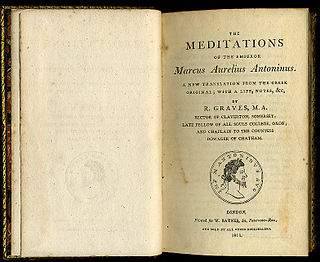
Titus Aelius Hadrianus Antoninus Pius was Roman emperor from 138 to 161. He was one of the Five Good Emperors from the Nerva–Antonine dynasty.

Marcus Aurelius Antoninus was Roman emperor from 161 to 180 and a Stoic philosopher. He was the last of the rulers known as the Five Good Emperors, and the last emperor of the Pax Romana, an age of relative peace and stability for the Roman Empire lasting from 27 BC to 180 AD. He served as Roman consul in 140, 145, and 161.
The 160s decade ran from January 1, 160, to December 31, 169.
Year 162 (CLXII) was a common year starting on Thursday of the Julian calendar. In the Roman Empire, it was known as the Year of the Consulship of Rusticusand Plautius.
Year 176 (CLXXVI) was a leap year starting on Sunday of the Julian calendar. At the time, it was known as the Year of the Consulship of Proculus and Aper. The denomination 176 for this year has been used since the early medieval period, when the Anno Domini calendar era became the prevalent method in Europe for naming years.
Marcus Cornelius Fronto, best known as Fronto, was a Roman grammarian, rhetorician, and advocate. Of Berber origin, he was born at Cirta in Numidia. He was suffect consul for the nundinium of July-August 142 with Gaius Laberius Priscus as his colleague. Emperor Antoninus Pius appointed him tutor to his adopted sons and future emperors, Marcus Aurelius and Lucius Verus.

Meditations is a series of personal writings by Marcus Aurelius, Roman Emperor from AD 161 to 180, recording his private notes to himself and ideas on Stoic philosophy.

Annia Aurelia Faustina was an Anatolian Roman noblewoman. She was briefly married to the Roman emperor Elagabalus in 221 and thus a Roman empress. She was Elagabalus' third wife.

Arethas of Caesarea was Archbishop of Caesarea Mazaca in Cappadocia early in the 10th century, and is considered one of the most scholarly theologians of the Greek Orthodox Church. The codices produced by him, containing his commentaries are credited with preserving many ancient texts, including those of Plato and Marcus Aurelius' "Meditations".
Eutychius Proclus was a grammarian who flourished in the 2nd century AD. He served as one of two Latin tutors for the Roman emperor Marcus Aurelius, along with Trosius Aper. He was from the North African city of Sicca Veneria.
Proclus or Proklos is the name of several historical figures.
Marcus Annius Libo was a Roman Senator active in the early second century AD.

Marcus Annius Verus Caesar was a son of Roman Emperor Marcus Aurelius and Empress Faustina the Younger. Annius was made caesar on 12 October 166 AD, alongside his brother Commodus, designating them co-heirs of the Roman Empire. Annius died on 10 September 169, at age seven, due to complications from a surgery to remove a tumor from under his ear. His death left Commodus as the sole heir.

Stoicism is a school of Hellenistic philosophy founded by Zeno of Citium in Athens in the early 3rd century BC. It is a philosophy of personal eudaemonic virtue ethics informed by its system of logic and its views on the natural world, asserting that the practice of virtue is both necessary and sufficient to achieve eudaimonia—flourishing by means of living an ethical life. The Stoics identified the path to eudaimonia with a life spent practicing the cardinal virtues and living in accordance with nature.
A sage, in classical philosophy, is someone who has attained wisdom. The term has also been used interchangeably with a 'good person', and a 'virtuous person'. Among the earliest accounts of the sage begin with Empedocles' Sphairos. Horace describes the Sphairos as "Completely within itself, well-rounded and spherical, so that nothing extraneous can adhere to it, because of its smooth and polished surface." Alternatively, the sage is one who lives "according to an ideal which transcends the everyday."
Gnaeus Claudius Severus was a Roman senator and philosopher who lived in the Roman Empire during the 2nd century AD.
Annia Faustina was a noblewoman of Anatolian Roman descent and a wealthy heiress who lived in the Roman Empire. She was a mother-in-law of the emperor Elagabalus.
The gens Cestia was a plebeian family at ancient Rome during the later Republic, and in imperial times. The first member of the gens to obtain the consulship was Gaius Cestius Gallus in AD 35. The family's name is commemorated on two monuments, the Pons Cestius and the Pyramid of Cestius which survive into modern times.
The gens Mettia, also written Metia, was a plebeian family at ancient Rome. Few members of this gens occur in history, and none attained the higher offices of the Roman state under the Republic. Several Mettii rose to prominence in imperial times, with at least three obtaining the consulship in the late first and early second century.